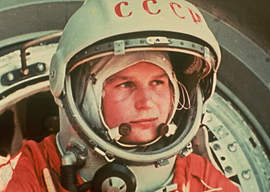
April 14, 2011

Valentina Tereshkova
Somewhere in the London Daily Mirror‘s billionfold archives is a photograph taken in February 1964 and published in that estimable newspaper of a small but enthusiastic crowd of Londoners on the Soviet Embassy’s grounds in Britain’s capital city.
They had assembled to greet Valentina Tereshkova, the first woman ever to be sent into Earth orbit. Among the faces in the crowd is that of my own youthful self. It was my first appearance in any nation’s major news media”somewhat embarrassing, given the location, for a future National Review contributor.
The shy, pleasant, rather square-shaped Ms. Tereshkova had orbited the Earth for three days the previous June, the fifth Soviet cosmonaut to go into space. The USA was two launches behind (unless you counted suborbital flights, which we space buffs didn’t). Her London trip was a goodwill visit, light relief for us Brits from the Conservative government’s scandal-plagued travails.
As a college freshman who had just emerged from an adolescence spent reading nothing but science fiction, I thought a cosmonaut was a very glamorous thing, well worth riding the Tube across London to see in the stocky Soviet flesh. For me, the draw was also slightly political. I was your average lefty student taking an elective Russian course at the School of Slavonic and East European Studies next door to my own college.
No doubt the Soviets under Stalin had “made mistakes,” but their technocratic egalitarianism clearly had a better claim on the future than Sir Alec Douglas-Home‘s musty, moth-eaten, creaking Toryism. The triumphs of their manned-and-womanned space program proved it, didn’t they? I strained to catch the valiant Ms. Tereshkova’s Russian words through the frosty, filthy London air.
The Soviet space program had begun with the flight of Yuri Gagarin in Vostok 1 fifty years ago this week. It was very melancholy to hear on my car radio this Tuesday a brief commemoration of Gagarin’s mission, followed immediately by a related news item: NASA had announced the disposal of the four space shuttles following their decommissioning later this year. The last two shuttle flights are scheduled for late April and late June. After that the four spacecraft”assuming there still are four, as the shuttle’s safety record is dire enough for there to be reasonable doubt”will be shipped off to museums in California, Florida, Virginia, and New York City. (Houston has a problem with the decision.)
And that will be the end of manned space flight. What a marvelous dream it was”a dream which, as I stood stamping my feet against the cold in the Soviet Embassy’s courtyard that day, I had been dreaming most of my life, inspired by Dan Dare, Kemlo, Tom Corbett, Destination Moon, Journey Into Space, the Science Fiction Book Club (six shillings and threepence per selection), and of course the pulp magazines”New Worlds, Science Fantasy (my favorite), Authentic, Astounding, Galaxy, and Fantasy & Science Fiction.
Back in 1964, manned space flight seemed like the beginning of a new era, humanity’s first steps toward the stars. We can now see that it was a transient phenomenon, a glory project for big nations with lots of surplus cash, managerial industrialism having attained its most productive phase while welfare socialism was still too young to suck up the trillions of tax-harvested dollars.
Whoa there, Derb (I hear you cry). What’s this about “the end of manned space flight”? It’s still going strong, isn’t it? There are six”count ‘em, six“astronauts on the International Space Station at this very moment. The Russians still have their program, the Chinese are working like gangbusters on theirs, and private-enterprise manned space flight is crawling out of its cradle here in the US of A. Sure, Apollo and the shuttle program may have been dead ends, but there’s still plenty of action ahead, isn’t there?